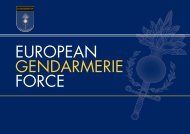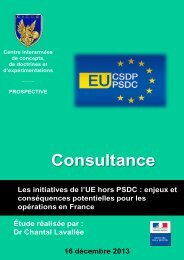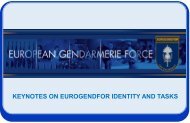Conference
science-research-bulletin-2013-conference
science-research-bulletin-2013-conference
Create successful ePaper yourself
Turn your PDF publications into a flip-book with our unique Google optimized e-Paper software.
EUROPEAN POLICE SCIENCE AND RESEARCH BULLETIN<br />
SPECIAL CONFERENCE EDITION<br />
THE HOUSE PROJECT<br />
Building directly on the achievements of EU-<br />
SEC, EU-SEC II, and indirectly from the success of<br />
the IPO Americas, The House Project runs from<br />
March 2012 to February 2014 and is funded by<br />
the European Commission’s 7th Framework<br />
Programme — DG Enterprise and Industry, and<br />
was launched to test the standards which had been<br />
outlined in EU-SEC II as common EU standards. As<br />
with the predecessor project, ‘The House’ project<br />
has seen an expansion in the consortium which<br />
now stands at 24 EU Member States ( 6 ).<br />
The process of ‘testing’ these standards as<br />
common EU standards involved the project<br />
partners attending the ‘associated events’ and<br />
discussing the standards of ‘The House’ in relation<br />
to accepted national practice. After a consultation<br />
process with the project partners, during which<br />
over 30 major events were considered, eight<br />
major events were chosen. Particular importance<br />
was attached to achieving a balance between<br />
sports competitions, mass gatherings and political<br />
summits as the planning challenge presented to<br />
security planners by each of these events differs<br />
greatly. The events at which ‘The House’ has<br />
tested or will test its standards are the following:<br />
• Euro Athletic Championships, Finland, June-<br />
July 2012<br />
• UEFA Euro Cup, Poland, June-July 2012<br />
• Bulgaria-Italy FIFA WC Qualification, Bulgaria,<br />
September 2012<br />
• EU Presidency, Ireland, January-June 2013<br />
• Rainbow March, Slovakia, September 2013<br />
• EU Presidency, Lithuania, June-December 2013<br />
• CEV Euro Volley, Poland, September 2013<br />
• Nuclear Safety Summit, Netherlands, April<br />
2014<br />
The ‘association’ of an event to the project<br />
involved project partners meeting with the<br />
security planners of the chosen major events in<br />
order to present the standards of ‘The House’.<br />
The subsequent discussion/consultation process<br />
helped to determine gaps and/or overlaps<br />
between ‘The House’ standards and those<br />
applied nationally. The dual goals of this process<br />
are on the one hand to assess the impact of the<br />
standards as common European planning and<br />
evaluation standards; and on the other hand,<br />
to assess their potential impact on the main EU<br />
security priorities (The Stockholm Programme<br />
and the EU Internal Security Strategy). The<br />
results of the consultation with national security<br />
planners were recorded and will form the basis<br />
of the final project reports. On the basis of these<br />
reports, a set of User Guidelines is being drafted<br />
to complement the manual published at the<br />
end of EU-SEC II; these guidelines will contain<br />
practical information for major events security<br />
planners and other security practitioners, on how<br />
to make full use of ‘The House’ and its services.<br />
A unique aspect of ‘The House’ project as a<br />
research project is that national end users from<br />
24 EU Member States are the main actors/<br />
researchers in the project. They have been<br />
appointed to various roles ranging from:<br />
Event Hosts, who organise and facilitate the<br />
consultation process with national security<br />
planners of associated events; ‘Standard Owners,’<br />
who act as ‘custodians’ of a standard, presenting<br />
the standards to national security planners at the<br />
associated event meetings; Task Team Members,<br />
who attend the associated events gaining and<br />
recording feedback from the national security<br />
planners on the impact of the standards as<br />
common European planning and evaluation<br />
standards and on their potential impact on<br />
the main EU security priorities. This method of<br />
policy development which involves the security<br />
planners at all stages ensures that they and their<br />
countries have a real ownership over the output.<br />
Furthermore, the project provides a platform for<br />
the exchange of ideas/information on security<br />
issues. Participation in the consortium provides<br />
all partners access to an international network of<br />
security experts who they have the opportunity<br />
to meet at regular intervals, and who they are in<br />
constant contact with, through their work within<br />
the project. The consortium also benefits from<br />
the input of an Advisory Board composed of<br />
( 6 ) Austria, Bulgaria, Cyprus, Denmark, Estonia, Finland, France, Germany, Greece, Hungary, Ireland, Italy, Latvia, Lithuania,<br />
Malta, the Netherlands, Poland, Portugal, Romania, the Slovak Republic, Slovenia, Spain, Sweden, and the United Kingdom.<br />
137





